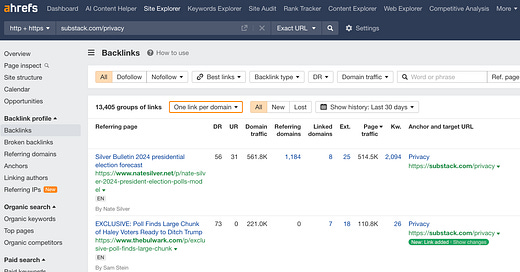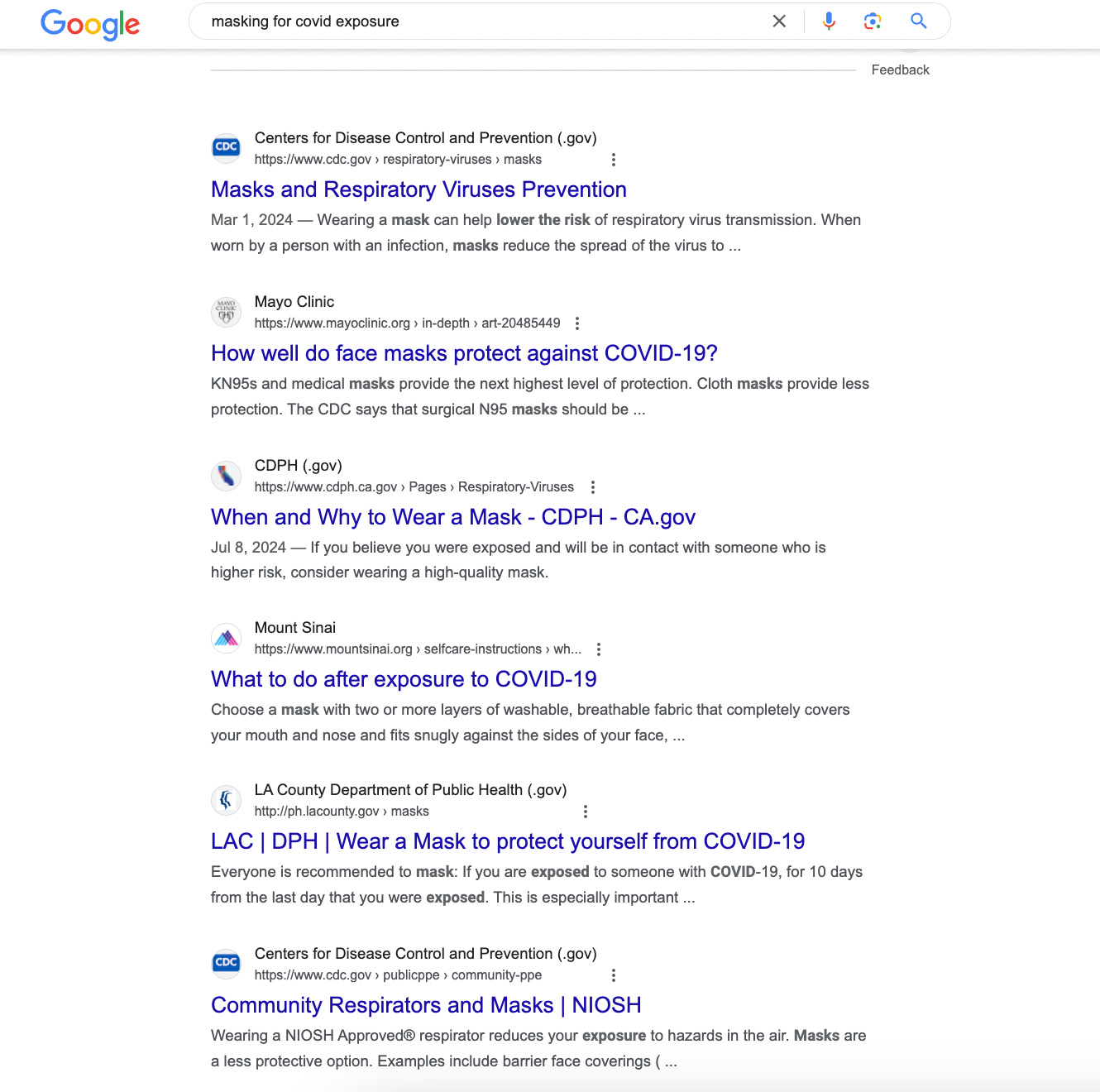Does Google search have political bias?
While Google has consistently denied intentional political bias in its search results, the public must trust that this is true.
This week’s newsletter is sponsored by the Digital PR agency Search Intelligence, which uses PR methods to grow a link portfolio and North Star Inbound, which is a recommended agency for SEO and content strategy. See their case studies linked in the newsletter.
I will be presenting at LocWorld in Monterey (October 29th) and SEO Summit in Sao Paulo (November 6th). Please message me if you will be at either event.
If you haven’t yet seen/heard my podcast with Lenny Rachitsky, check it out here
In a recent All-In-Podcast, David Sacks suggested that Google was biased against some substacks on search. It’s hard to parse the precise visibility of political Substack rankings on search results because there is no quantitative metric on political leanings for particular substacks. Still, he did miss one obvious point: most of the most popular Substacks use their domains rather than a Substack domain, which I would recommend anyone on Substack do.
How to find all Substack-hosted sites
If anyone is interested in doing a full study on the visibility of Substacks on Google search, you can discover all the domains hosted on Substack by using Ahrefs or Semrush to see websites that link to the Substack privacy policy and then looking up the traffic on Ahrefs and Similarweb. Again, there’s no flag on competitive leanings.
[SPONSORED by Search Intelligence]
Digital PR link building tip:
Use advanced Google search operators to find Digital PR ideas that are most likely to be picked up by popular outlets.
Here is an example:
"site: publisher_domain intitle:revealed intitle:most"
This search will give you the articles that a publication wrote, which contain the words “revealed” and “most” in their title.
From this quick analysis, an overall conclusion is that many Substacks have substantial visibility in search results.
While this accusation against Google was incorrect, I still thought it was an interesting point to dissect whether Google had political bias in its ranking because it is a common accusation made by politicians who don’t have great search visibility.
Algorithms are opaque
First, the algorithm is highly opaque, and the lack of transparency in who and how they rank could lead anyone, not just a politician, to accuse them of unfairness. An individual is only looking at the traffic and visibility that they see and doesn’t have a sense of how much traffic and visibility their competitors have.
Most digital marketers can access tools like Ahrefs and Semrush to help them analyze this question, but the average small business or politician cannot.
Google denies bias
While Google has consistently denied intentional political bias in its search results, the public must trust that this is true. The company claims its algorithms are designed to provide the most relevant and high-quality results regardless of political stance. Google has implemented various measures to ensure neutrality, including using diverse rater pools for quality assessments.
The reality is that technical factors can explain many instances of perceived bias. For example, the prominence of certain news sources in search results might be due to their better backlinks, fresher content, or overall better SEO. A little-known politician with limited media coverage might find that their own LinkedIn page is outranking their political domain. This is something that Google tries to pick up on, but without consistent signals, they will miss it.
There are bugs and outliers
(I don’t want to weigh in on this particular event highlighted by Elon Musk because it may be a very specific instance where the algorithm could have had bias, but from the murmurs I heard from Google, this might have been a genuine machine learning issue rather than an intentional manipulation.)
While some studies suggest bias, others have found no significant political slant in Google's search results. A 2019 study by the Economist analyzed Google search results for political terms and found no evidence of ideological bias. The study suggested that any perceived bias might reflect the overall media landscape rather than Google's algorithms.
Google needs to be neutral
As a business, Google has strong incentives to remain politically neutral. Demonstrating bias could lead to loss of user trust, regulatory scrutiny, and potential financial consequences. Google's business model relies on providing relevant results to all users, regardless of political beliefs.
The Challenge of Defining Bias
One of the main difficulties in assessing political bias in search results is defining what constitutes "unbiased" results. In a polarized media landscape, what one person considers neutral might be considered biased by another. This subjectivity makes it challenging to reach a consensus on the presence or absence of bias.
The Role of User Behavior
Search results are partly personalized based on user behavior, location, and search history. Two people searching for the same term might see different results. What might appear as bias could sometimes be a reflection of a user's own online behavior and preferences.
Combating Misinformation vs. Censorship
Google's efforts to combat misinformation and promote authoritative sources can sometimes be perceived as political bias. For instance, during the COVID-19 pandemic, Google prioritized information from government health authorities, which some interpreted as suppressing alternative viewpoints.
The Broader Media Landscape
The broader media landscape might influence the perception of bias in Google search results. If there are more left-leaning news outlets producing online content, this could naturally lead to more left-leaning results without any intentional bias from Google.
If the left-leaning sites are mainstream media linked to by academic institutions and the right-leaning sites are more blog-like with fewer inbound citations, the left-leaning sites will inevitably have more accrued algorithm signals.
So, it is biased?
While there can always be anecdotal evidence to support a claim of bias, I believe Google has every incentive not to be biased. Google desires to be the most trusted source for discovering information for all people regardless of where they fall on a political continuum. If Google were perceived to be biased in any direction, it would eventually erode its base and lose market share, even with its monopoly.
This is just a belief, though. My main reason why Google isn’t biased is how complex it might be to build undetectable bias into their algorithms.
The algorithms use quantitative signals to determine relevancy and rankings overall. When a site receives a penalty, it hangs on to the site like a weighted anchor, but there can be no exceptions. So, for example, if Foxnews.com has a weighted anchor that pulls down its overall visibility, there would be no easy way to create exceptions that would allow that anchor not to pull down its visibility for right-leaning queries where Foxnews.com would be expected to be visible.
Similarly, if MSNBC.com was given a boost that makes it rank higher than FoxNews every time both FoxNews and MSNBC were visible on the same query, there would be no easy way to build in exceptions that would allow MSNBC to not outrank CNN too on every query where they compete. They could build in some specific rules, but the query landscape is so diverse that, eventually, it will fail, and the bias will be obvious.
There are so many variables that it's hard to pinpoint true bias unless a smoking gun API leak shows bias built into the system. Without that, I would likely conclude that even if some executives at Google want to bias the algorithm, implementing it would just be too hard.
Is Google biased? Probably not. It’s just too difficult to implement and hide.
Brought to you by North Star Inbound—the sales enablement SEO agency.
Drive High Intent Leads with SEO.
What happens when you combine best-in-class SEO with conversion optimization?
BigRentz's traffic increased by 186% (85k), added 1950 conversions in 12 months.
Self Financial's traffic increased by 50k/month, and added 685 new customers.
Lastly, Secure Data added 1968 phone calls.
North Star Inbound’s SEO strategies earn leads, conversions, and revenue..
Book a call for a free content audit and 10% off any engagement.
Intrigued? [Learn more here]






Turning over 96% left leaning results with CNN basicly always being the top result.
Google is bias as hell
https://www.allsides.com/blog/google-news-shows-strong-political-bias-allsides-analysis
It doesn't even try to hide it.
You are bias.
A 2019 study? Come on man. Then blaming it's sources is lame. I can't get pertinent search results to questions that don't tote a far left narrative. Google is nothing short of an indoctrination device.